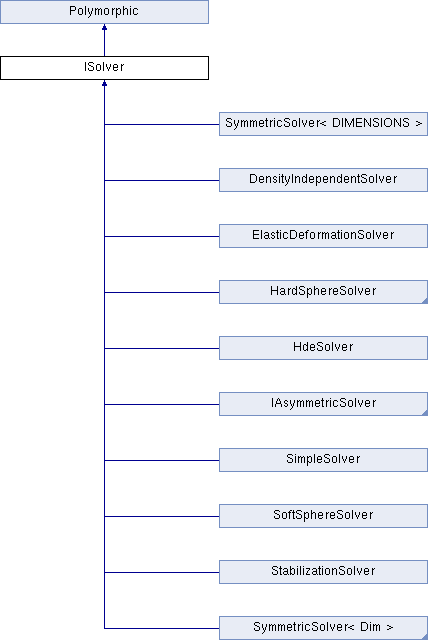Base class for all solvers. More...
#include <ISolver.h>

Public Member Functions | |
| virtual void | integrate (Storage &storage, Statistics &stats)=0 |
| Computes derivatives of all time-dependent quantities. More... | |
| virtual void | collide (Storage &UNUSED(storage), Statistics &UNUSED(stats), const Float UNUSED(dt)) |
| Detects the collisions and computes new positions of particles. More... | |
| virtual void | create (Storage &storage, IMaterial &material) const =0 |
| Initializes all quantities needed by the solver in the storage. More... | |
 Public Member Functions inherited from Polymorphic Public Member Functions inherited from Polymorphic | |
| virtual | ~Polymorphic () |
Detailed Description
Base class for all solvers.
This generic interface allows to use the code for any problems with explicit timestepping, meaning it is SPH-agnostic. It can be used also for N-body simulations, etc. The solver computes derivatives of time-dependent quantities and saves these derivatives to corresponding buffers in given Storage object. The temporal integration in then performed by time-stepping algorithm.
Member Function Documentation
◆ collide()
|
inlinevirtual |
Detects the collisions and computes new positions of particles.
The positions and velocities of particles need to be tracked at the beginning of timestep, the actual step is done by the calling timestepping. Default implementation does not handle collisions, so the particle positions are simply advanced as
\[\vec r \mathrel{+}= \vec v {\rm d}t \,.\]
This is suitable for solvers with no concept of collision (for example collisions do not have to be handled explicitly in SPH, they are a result of solving equations of hydrodynamics). Function is executed for each drift timestep (may be called more than once in a single step).
- Parameters
-
storage Storage containing all quantities. stats Object where the solver saves collision statistics. dt Drift timestep, or time interval in which the collisions should be detected. Note that this timestep can be different than the one in statistics, depending on selected timestepping algorithm (for example LeapFrog uses drift step dt/2).
◆ create()
Initializes all quantities needed by the solver in the storage.
When called, storage already contains particle positions and their masses. All remaining quantities must be created by the solver. The function is called once for every body in the run. The given storage is guaranteed to be homogeneous; it contains only a single material.
- Parameters
-
storage Particle storage that shall be modified as needed by the solver. material Material containing parameters of the body being created. The solver can also set up necessary timestepping parameters of the material (ranges and minimal values of quantities).
Implemented in HdeSolver, SymmetricSolver< Dim >, SymmetricSolver< DIMENSIONS >, SummationSolver< Dim >, StabilizationSolver, SimpleSolver, GradHSolver, ElasticDeformationSolver, DensityIndependentSolver, IAsymmetricSolver, SoftSphereSolver, HardSphereSolver, and AggregateSolver.
◆ integrate()
|
pure virtual |
Computes derivatives of all time-dependent quantities.
The solver can also modify the quantities arbitrarily. It is however not recommended to perform the integration in the solver (using the time step stored in Statistics) as this is a job for timestepping. The solver can modify quantities using boundary conditions, inter-quantity relationships (such as the summation equation for density in SPH), clamping of values etc. It is also possible to add or remove particles in the storage and modify materials. Threads running concurrently with the solver must assume the solver can modify the storage at any time, so accessing the storage from different threads is only allowed before or after integrate; the is no locking for performance reasons.
All highest order derivatives are guaranteed to be set to zero when integrate is called (this is a responsibility of ITimeStepping implementation).
- Parameters
-
storage Storage containing all quantities. stats Object where the solver saves all computed statistics of the run.
Implemented in HdeSolver, SymmetricSolver< Dim >, SymmetricSolver< DIMENSIONS >, StabilizationSolver, ElasticDeformationSolver, DensityIndependentSolver, IAsymmetricSolver, SoftSphereSolver, HardSphereSolver, and AggregateSolver.
The documentation for this class was generated from the following file:
- /home/pavel/projects/astro/sph/src/core/timestepping/ISolver.h